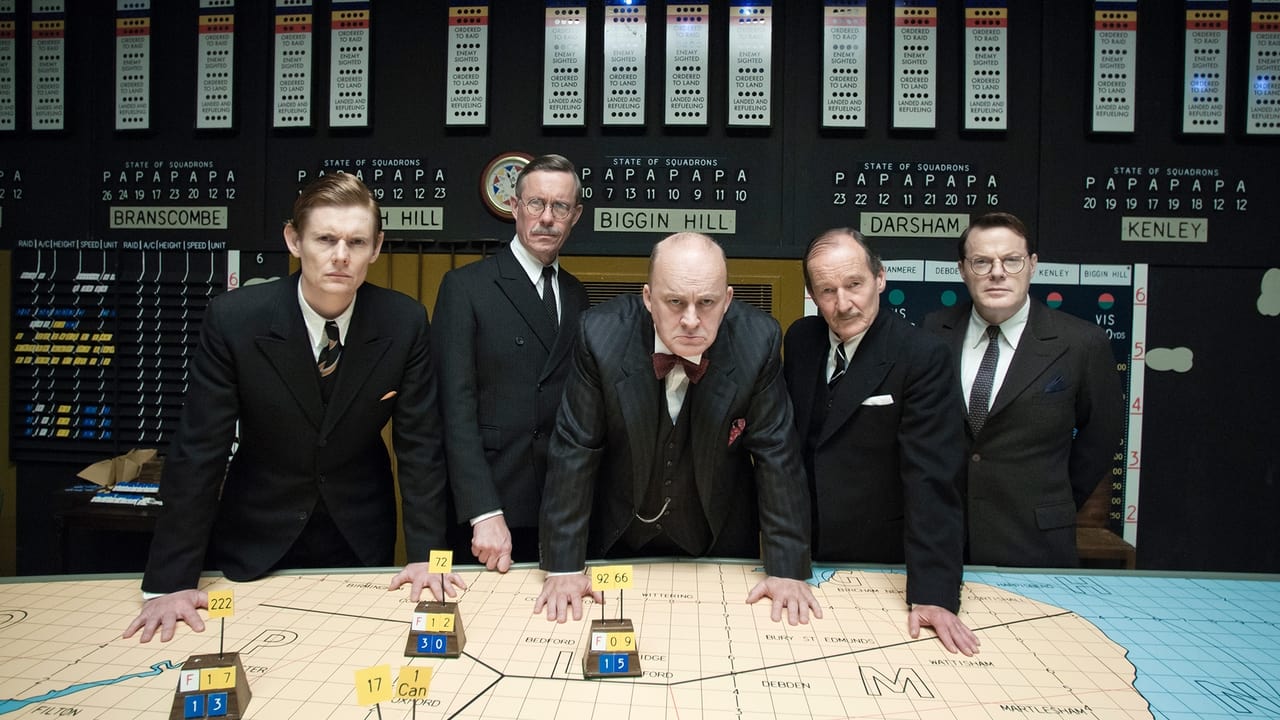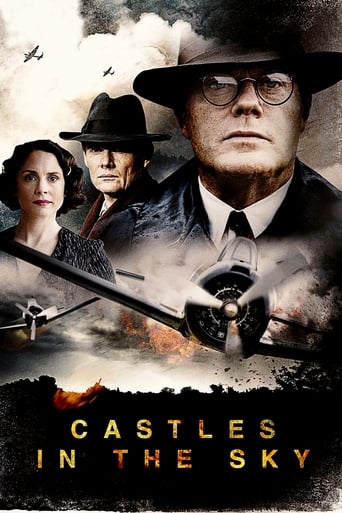

How do ideas get into production? Here we are shown how radar came to be. And what a struggle. From the initial ideas, (first developed in Germany apparently, but ignored!), but under the dire threat of Nazi bombers and the mad Hitler, Britain's committees got going.Eddie Izzard is Watson-Watt and goes through the stages he had to do to get the funding and the support to prove his ideas would work. There is quite of bit of personal side-tracking, with the Official Secrets Act, and his abandoned wife and family. It is not just Watson- Watt of course, there were a team of dedicated and really hard-working colleagues too.Very little technical explanation, but that can be obtained elsewhere, (ie, youtube), and it is important to know about the personal sacrifices that sometimes have to be, and were, made.
... View MoreA local theatre has been showing little-known WW II films this month (August 2015) on the 70th anniversary of the end of that war, and this film on the British development of radar for the RAF prior to WW II was one of them. I'm interested in the historical development of technology plus I had seen a PBS Nova show several years ago on WW II's spur to radar's development, so I was interested in this BBC production. In addition, Ian Kershaw, a well-respected British historian, wrote the script. I was not disappointed; it was a very enjoyable film for me.I had also seen earlier this year "The Imitation Game" featuring Alan Turing and his team of British mathematicians and codebreakers at Bletchley Park, and the parallels with "Castles" are striking. Both films have groups of unconventional geniuses monitored by class-conscious representatives of Britain's ruling circles and sequestered in rural hideaways where they work under great pressure to help win the war ("Imitation") or prepare for war ("Castles"). Robert Watson Watt, played by Eddie Izzard, is the Alan Turing of "Castles", and although not as eccentric as Turing, is sufficiently unconventional to warrant suspicion and doubt by those in the British government in the late-30s who must trust him with their scarce resources. His idea is to use a series of radio beams: (1) of sufficient strength to echo off incoming objects, e.g., bombers, at a sufficient distance, (2) and of sufficient number to ascertain their direction. The senior officials want him to use the nation's top physicists from Oxford and Cambridge to assist him, but Watt is an engineer for the Meteorological Service and wants to use his fellow "weather engineers" who can think outside-the-box. He gets his way against the rigid class structure of pre-war Britain, and for my money the visible drama of demonstrating radar's efficacy in detecting planes from 60 miles out (as shown in "Castles") is more striking than the drama that unfolds in "Imitation" where the group is finally able to read a coded message. The end of "Castles" shows how well radar has been integrated into RAF's Fighter Command by taking us inside their command centers that are ready to scramble fighters at the first ping on the radarscope on the eve of the Battle of Britain (when the Luftwaffe had three times as many planes at the outset).Modern wars, for better or worse, are said to be won with economic production and technology, and it's thus gratifying to see little-known figures like Watt featured in a film like this. It's sad to compare, however, that Watt was rewarded with a knighthood in 1942 for his pre-war development of radar, while Turing, pledged to secrecy by the British government for his war-time codebreaking, was not honored during his lifetime and apparently committed suicide.
... View MoreIn 5 years, this is only the second review that I have done on IMDb. The reason for this review is that there were only 4 other user reviews and this movie deserves much more so here I am writing a review. I started off watching by myself and a few minutes into the movie my son joined me. My son is an action movie buff and will usually leave the room if it isn't action so I was surprised to find him still there at the end of 'Castles In the Sky'. Not only was he still there, he initiated a discussion about the movie with respect to his new-found know knowledge of just how important radar was in helping Britain win the second world war. This movie was also very inspiring since Robert Watts developed radar in the face of adversity and very much to his credit, he was able to overcome many obstacles while under immense pressure. I know that myself and my son left this movie with a 'can- do' attitude. The acting was superb and even though it was a dark time for England, there was some light-hearted scenes which were thoroughly enjoyed by both of us. I can absolutely state that this movie is a good movie that I would highly recommend to others.
... View MoreFor many switching on to this drama - as other reviewers have indicated - the chief attraction of CASTLES IN THE SKY lies in watching Eddie Izzard performing a straight role as the co-inventor of radar, Robert Watson Watt. Sometimes his Scottish accent seems a little too broad, almost as if he were trying to hard, but on the whole he gives a creditable characterization of a scientist for whom the word "no" spurred him on to even greater efforts to make his device work, despite budgetary restrictions.Gilles MacKinnon's production contains several other noteworthy elements. It makes intelligent use of symbolism - for example, the tie, which is here used as a representative of Establishment values, the kind of thing Watt and his co-workers explicitly repudiate. Whitehall mandarins Albert Rowe (Julian Rhind Tutt) and Henry Tizard (Alex Jennings) wear ties; the only time Watt sports one is when he is expecting a visit from the Air Ministry to inspect his progress. As soon as they leave, he rips it off. There is also the symbolism of catching - on at least three occasions Watt catches a tennis or a ping-pong ball, at moments when he makes a scientific breakthrough, suggesting success. The late Thirties atmosphere of grim austerity is cleverly evoked through lighting: Watt's scientists have to work in primitive conditions, often with antiquated equipment, as Whitehall refuses to give them sufficient subsidy to expand their operations. The group works together in ill-lit rooms, often for long hours at a stretch. With the onset of war, the atmosphere becomes even grimmer; there is a memorable sequence where Watt is shown climbing up to ground level from the Government's defense bunker in a stone passageway green with mildew.Thematically speaking, CASTLES IN THE SKY not only celebrates Watt's achievement but shows the strength of group loyalty at a time of severe national crisis. The scientists are totally committed to the project, and when one of them (Iain McKee) is exposed as a mole, supplying information to Professor Lindemann (David Hayman), he is ruthlessly cast aside. When their task is finally accomplished, no one really takes the credit; they believe they have been working for the national interest.Sometimes Ian Kershaw's script seems a little anachronistic (the phrased "loved ones," to describe one's nearest and dearest was definitely not in circulation in the Thirties), but CASTLES IN THE SKY is nonetheless a value historical recreation of a defining moment in British history.
... View More